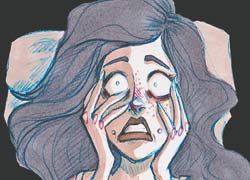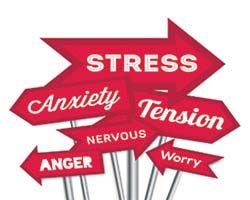You! takes a look at the causes and symptoms of generalized anxiety disorder (GAD)...
health
You! takes a look at the causes and symptoms of generalized
anxiety disorder (GAD)...
Are you one of those who worry excessively about things that are unlikely to happen? Do you feel tensed and anxious all day long for no real reason? Even though everyone gets anxious sometimes, the fact is if your worries and fears are so constant, you may have generalized anxiety disorder (GAD). This is a category of anxiety disorder that may complicate the journey of life for those undergoing it and is characterized by persistent, excessive, and unrealistic worry about everyday things.
 Yes, don’t just wave away your anxiety attacks and control the problem before it gets out of hand. GAD is mentally and physically exhausting. It drains your energy, interferes with sleep, and wears your body out. It paralyzes one with an omnipresent sense of dread and constant worries about the future. These worries make it difficult for one to concentrate at work or relax at home. GAD is diagnosed when a person finds it difficult to control worry for at least six months or more. GAD is generally found more in women.
Yes, don’t just wave away your anxiety attacks and control the problem before it gets out of hand. GAD is mentally and physically exhausting. It drains your energy, interferes with sleep, and wears your body out. It paralyzes one with an omnipresent sense of dread and constant worries about the future. These worries make it difficult for one to concentrate at work or relax at home. GAD is diagnosed when a person finds it difficult to control worry for at least six months or more. GAD is generally found more in women.
What causes GAD?
Since GAD is a mental illness, it occurs due to an imbalance of the brain chemicals, serotonin and noradrenalin, which are involved in the control and regulation of mood. Although the exact cause of GAD is unknown, there is evidence that biological factors, family background, and life experiences, particularly stressful ones, play a role. GAD is also common in individuals with a history of substance abuse and a family history of the disorder. Once GAD develops, it may become chronic, but can be managed or eliminated with proper treatment. Other causes include over-activity in areas of the brain involved in emotions and behaviour as well as having a painful long-term health condition. Many a time, a person whose temperament is timid or negative or who avoids anything dangerous may be more prone to generalized anxiety disorder than others are. Research has also revealed smoking and excessive caffeine usage as risk factors for developing anxiety disorders.
Symptoms
Generalized anxiety disorder affects the way a person thinks, but the anxiety can lead to physical symptoms, as well. GAD symptoms can vary from person to person. Some of the symptoms may include:
Persistent worrying about small or large concerns that’s out of proportion to the impact of the event
Inability to set aside or let go of a worry
Inability to relax, restlessness, and feeling keyed up or on edge
Difficulty concentrating, or the feeling that your mind ‘goes blank’
Worrying excessively
Distress about making decisions for fear of making the wrong decision
Difficulty handling uncertainty or indecisiveness
Irritability
Muscle tension, sweating and headaches
Nausea, fatigue, diarrhoea or irritable bowel syndrome
Professional treatment for GAD
The two main treatments for generalized anxiety disorder are therapy and medications. You may benefit most from a combination of the two, but it may also take some trial and error to discover which treatments work best for you.
Therapy: This is a key component of treatment and studies show that therapy is as effective as medication for most people. Cognitive-behavioural therapy (CBT) is one type of therapy that is particularly helpful in the treatment of GAD. CBT examines distortions in our ways of looking at the world and ourselves. Your therapist will help you identify automatic negative thoughts that contribute to your anxiety. CBT focuses on teaching you specific skills to gradually return to the activities you’ve avoided because of anxiety.
Medications: Several types of medications are used to treat generalized anxiety disorder, including antidepressants and buspirone, an anti-anxiety medication. Some patients are advised to take benzodiazepines, these are sedatives for relief of anxiety symptoms. However, before taking any medication, talk with your doctor about benefits, risks and possible side effects.
Lifestyle and home remedies
Apart from contacting a doctor, those with GAD can fix the way they think and feel by bringing a change into their lifestyle. Here’s what you can do:
Keep physically active: Develop a routine so that you’re physically active most days of the week. Exercise is a powerful stress reducer. It may improve your mood and help you stay healthy. Start out slowly and gradually increase the amount and intensity of your activities. By adding this mindfulness element, by really focusing on your body and how it feels as you exercise, you’ll not only improve your physical condition faster, but you may also be able to interrupt the flow of constant worries running through your head.
Quit smoking and cut back or quit drinking coffee: Both nicotine and caffeine can worsen anxiety. While it may seem like cigarettes are calming, nicotine is actually a powerful stimulant that leads to higher levels of anxiety.
Use relaxation techniques: When you’re relaxed, the complete opposite happens. Your heart rate slows down, you breathe slower and more deeply, your muscles relax, and your blood pressure stabilizes. Since it’s impossible to be anxious and relaxed at the same time, strengthening your body’s relaxation response is a powerful anxiety-relieving tactic. Visualization techniques, meditation and yoga are examples of relaxation techniques that can ease anxiety.
Make sleep a priority: Do what you can to make sure you’re getting enough sleep to feel rested. If you aren’t sleeping well, see your doctor.
Look at your worries in new ways: You may feel like your worries come from the outside-from other people, events that stress you out, or difficult situations you’re facing. But, in fact, worrying is self-generated. The trigger comes from the outside, but an internal running dialogue maintains the anxiety itself. Once you’ve given up the idea that your worrying somehow helps you, you can start to deal with your worry and anxiety in more productive ways.
Connect with others: Support from other people is vital to overcoming generalized anxiety disorder. In fact, GAD only gets worse when you feel powerless and alone. Social interaction with someone who cares about you is the most effective way to calm your nervous system and diffuse anxiety, so it’s important to find someone you can connect with face to face on a regular basis.